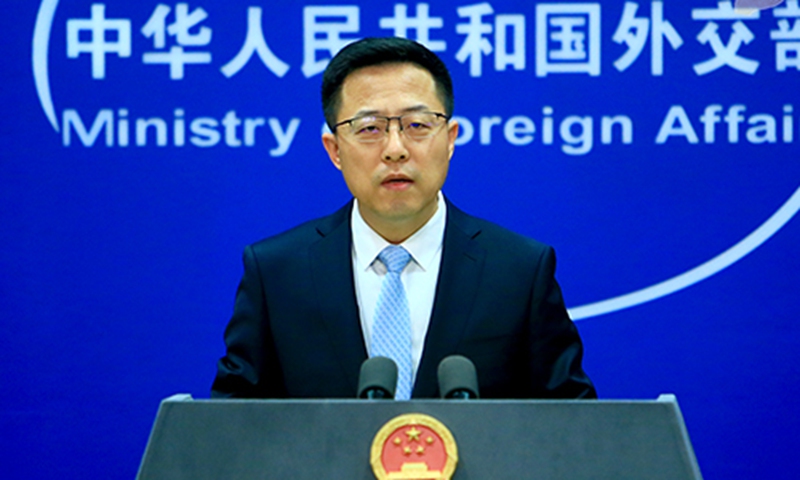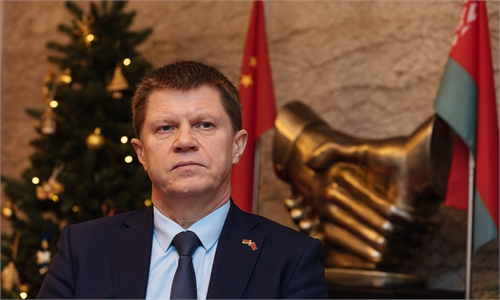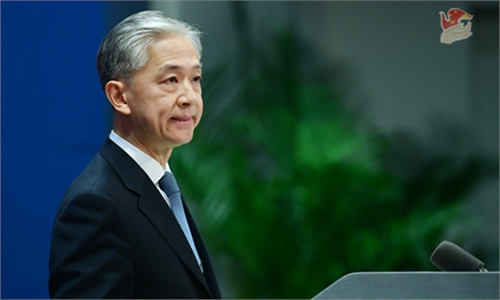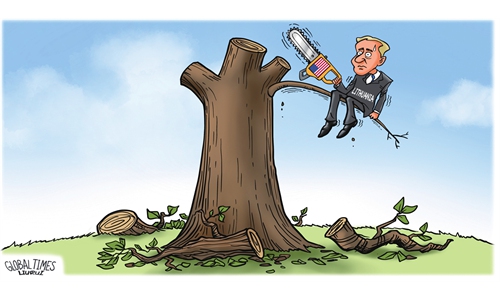Lithuania sees unaffordable fallout by trampling on One China principle
Lithuania sees unaffordable fallout from reckless provocations

Chinese Foreign Ministry spokesperson Zhao Lijian Photo: fmprc.gov.cn
Lithuania's economic reliance on China has been on the rise in recent years, with its China-bound exports ranging from farm produce and beer to lasers, but analysts have sounded the alarm over the unaffordable fallout on Lithuania's economy from its dangerous provocation against China by trampling on the One China principle.Lithuania has recklessly violated the One China principle, a basic norm of international relations and a universal consensus held by the international community, a move destined to be spurned and opposed, Chinese Foreign Ministry spokesperson Zhao Lijian told reporters on Monday.
Lithuania stands on the opposite side of universal principles and justice which will never end well, Zhao said, noting that those who insist on acting in collusion with Taiwan secessionist forces will eventually be swept into the garbage bin of history.
A surge in Lithuania's farm produce shipments to China in the wake of a bilateral agricultural action plan signed in 2017 was one of the most convincing examples of the Baltic nation's dependence on China's market.
With the 2018-20 agricultural cooperation action plan bearing fruits, Lithuania's agricultural sector moved onto the fast track. China signed protocols that allowed for Lithuanian farm produce including fish, dairy products, beef and wheat to enter its giant market.
Lithuania exported 300,000 tons of wheat to China at a value of $52.3 million in 2019, and the figure soared to $75 million in 2020, according to numbers disclosed by then Chinese ambassador to Lithuania Shen Zhifei in an interview with the Baltic Times in May.In the case of beef exports, the number was 472.1 tons worth $2.1 million.
The interview was published before China's August decision to recall Shen and demand that the Lithuanian government recall its China ambassador amid fraying ties.
Lithuania recklessly provoked China by allowing Taiwan Island's separatist authority to set up a representative office in Lithuania.
In response, China downgraded diplomatic relations with Lithuania to the level of charge d'affaires.
Agriculture contributes 3.2 percent of Lithuania's GDP and employs 7 percent of its workforce, according to French banking group Crédit Agricole, which listed wheat and meat as Lithuania's main agricultural exports.
Now, there are rising complaints among Lithuanian exporters that their cheese, grain, beer, wood and other items are no longer on China's shopping list, according to local media reports.
Volfas Engelman, the legendary beer of Lithuania, has failed in its one-decade effort to establish a foothold in the Chinese market, Chinese news site guancha.cn reported on Sunday, citing Lithuanian National Radio and Television. In October, the company's Chinese partners cancelled all import orders, resulting in losses of 500,000 euros ($563,493), the report said.
Volfas Engelman didn't respond to the Global Times' request for comment as of press time.
As for lasers, which glorify the name of Lithuania in the global technology sphere, souring relations are exacerbating the travails confronting the Baltic nation.
Several Chinese laser industry representatives told the Global Times in November that cooperation and exchanges between the Chinese and Lithuanian laser industries had been disrupted by the pandemic and, in light of Lithuania's mistake over the One China principle, cooperation won't resume in the foreseeable future.
The Chinese mainland is the largest market for Lithuania's laser industry, accounting for 31.6 percent of Lithuania's laser exports, the Asia Times reported in October. The US takes the second spot with 15.8 percent of the export market while Germany holds 12.6 percent.
Such woes could be feeding through to Lithuania's industrial sector, which according to Crédit Agricole accounts for 25.3 percent of GDP and employs roughly 26 percent of the active population.
"Components from Lithuania still go through customs clearance in a normal manner … some clients would ask whether the products are from Lithuania, but thus far transactions remain unaffected. Future [trends] are still being watched," a Chinese agent for a Lithuanian electronic component maker told the Global Times on Monday on condition of anonymity.
Lithuania's auto part sector has also lately been in the limelight amid concerns that local automotive supply chains, might take a battering too. German car parts giant Continental is being asked to halt using components made in Lithuania, Reuters reported on Friday.
Continental couldn't be immediately reached for comment.
Hella, another German automotive supplier that opened an electronics plant in Lithuania in 2018, said it didn't "want to comment on the topic," when reached by the Global Times on Monday.
Put in perspective, overall trade between China and Lithuania rose from $1.35 billion to $2.14 billion in 2015-19, registering 82 percent growth over the five years, according to a report by Forward Intelligence earlier this year.
China's trade with Lithuania grew 7.6 percent year-on-year to reach $2.29 billion in 2020, while Lithuania's exports fell 3.4 percent and its imports shrank 9.3 percent, per Forward Intelligence.



